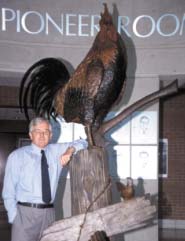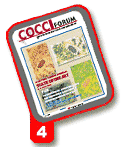COCCI People - Dr H.David Chapman
Navigating the sparkling new waters of coccidiosis control
 Chapman and feathered friend in
the lobby of the Center of Excellence
for Poultry Science, University of
Arkansas.
|
What does it take
to be one of the
world's leading
and most respected authorities
on coccidiosis?
You have to meet several
rigorous criteria, says
Dr. Harry Danforth, now
technology transfer coordinator
for USDA's Henry
A. Wallace Agricultural
Research Center in
Beltsville, Md.
Obviously, you have to
be passionate about and
devoted to coccidiosis,
Danforth points out.
"But you also have to be
a great researcher, great
teacher and a great colleague"�
very approachable and generous
about sharing your time and
expertise," he emphasizes.
So who best fits that profile?
"David Chapman," Danforth replies
instantly.
Having previously worked in the
world of coccidiosis research for more
than 20 years, Danforth is quick to extol
the exemplary qualities and qualifications
of his long-time friend and colleague.
Integrated Approach
"Most notably, David Chapman has
been one of the leading proponents of
an integrated approach to coccidiosis
control," Danforth begins. "He supports
the use of live oocyst vaccines and
anticoccidial drugs in well-managed
rotational programs to prevent the disease."
A native of the United Kingdom, Dr.
H. David Chapman obtained a B.S.
degree in Zoology at Imperial College
of Science and Technology, London
University, and a Ph.D. in Parasitology
at the University of York in the U.K. His
doctoral project focused on parasites
that plague our finned friends, specifically
fish flukes.
Degrees in hand, he worked briefly
in the pharmaceutical industry, where
he conducted research in coccidiosis
and liver fluke disease in cattle and
sheep. In 1972 he moved to the
Houghton Poultry Research Station
(HPRS), a former British organization
devoted to diseases of fowl. It was
there Chapman immersed his energies
in his life's work that would earn him
tremendous notoriety and acclaim in
the international coccidiosis arena.
During 18 years at the HPRS,
Chapman concentrated on the mechanisms
of drug resistance, which was
evolving as an important economic
problem during that time.
Speaking of economics, government
budget cuts for agricultural research
during the late 1980s prompted
Chapman to research greener pastures
for his professional endeavors.
A New Challenge
In 1990, Chapman was lured to
Razorback country in the state where
80% of agricultural production involves
poultry. He accepted a faculty position
at the University of Arkansas (UA),
Fayetteville, Ark. His appointment
involves 90% research and 10% teaching.
With the completion of 112,000-
square foot, state-of-the-art facilities in
1995, the UA Department of Poultry
Science "some 30-plus faculty members
strong "has become a worldclass
Center of Excellence for Poultry
Science and the perfect venue for
Chapman's research. During his tenure
at UA, Chapman has developed important scientific information with practical
value to the poultry industry worldwide.
"Since I came to the University of
Arkansas, my primary research interest
has been exactly the same as it was in
my previous position, control of coccidiosis,"
Chapman says.
"The first question I tackled here
was whether or not you can use vaccines
to restore sensitivity to drugs," he
relates.
Scientific Breakthroughs
Using coccidial strains that dated to the
1950s, Chapman was the first scientist
to prove that sensitivity to coccidiostats
can be restored by vaccinating broilers
for coccidiosis. This landmark research,
highlighted in a 1994 scientific paper,
has been a major breakthrough in poultry-
producing regions where drug
resistance was previously a problem.
The results of this project have subsequently
been corroborated by a number
of fellow "coccidiologists," including
Danforth.
Practical Protocols
Additionally, Chapman has provided a
clear understanding of the role that
immunity plays in assuring the efficacy
of ionophores as anticoccidial drugs. To
that end, he has demonstrated how
immunity produced through exposure
to partially ionophore-resistant strains
of coccidia works in concert with
ionophore anticoccidials to ensure optimum
broiler growth. As a result of this
work, he has been able to recommend
viable management protocols conducive
to long-term coccidiosis control.
Moreover, Chapman has demonstrated
that these favorable effects can
be enhanced through the use of a vaccine
containing drug-sensitive coccidia.
He further showed that coccidia introduced
through vaccination flush the
resident population of drug-resistant
coccidia, making the subsequent use of
anticoccidial drugs more effective in
broiler facilities.
To what does Chapman attribute his
great success with coccidiosis research?
"People describe me as 'organized' and
'meticulous,'" he relates. "I'm very
detail-minded and I always strive to do
things carefully, correctly and in an
unbiased way."
"Considering David Chapman's
many outstanding qualities, I most
admire his communication skills,"
Danforth mentions. "He is an excellent
speaker, writer and editor with a
tremendous skill for organizing and
relaying his thoughts and scientific
information in a way that anyone
involved in the poultry industry can
understand and benefit from."
Chapman is the sole or principal
author of more than 90 scientific publications,
including many reviews and
book chapters. He is a frequent featured
speaker at national and international
meetings.
It may sound like Chapman works
all the time, but during his business
travels, he often pursues his favorite
hobby, bird watching.
Top Honors
In 2000, Chapman received the prestigious
National Chicken Council Broiler
Research Award in recognition of his
profound body of work. In 2001, the
coveted John W. White Research Award came his way from the UA Dale
Bumpers College of Agricultural, Food
and Life Sciences.
"I love my work and I wouldn't
change my career for anything,"
Chapman emphasizes. "Even though
my primary responsibility is research,
the most satisfying part of my appointment
is teaching. Being involved with
young people is the biggest advantage
of the job."
Chapman contributes to an introductory
animal science course for
undergraduates, and also teaches a
graduate course in poultry diseases,
including coccidiosis, of course.
"David Chapman's ideas relative to
coccidiosis control are extremely innovative
and definitely ahead of their
time," Danforth adds.
"It will take a while to educate producers
and everyone involved in the
industry that his recommendations are
critical to flock health and profitability.
But David is taking the lead in that
regard and undoubtedly the poultry
industry's ability to control coccidiosis
in the years ahead will depend on his
work."
Source: CocciForum Issue No.4, Schering-Plough Animal Health.







